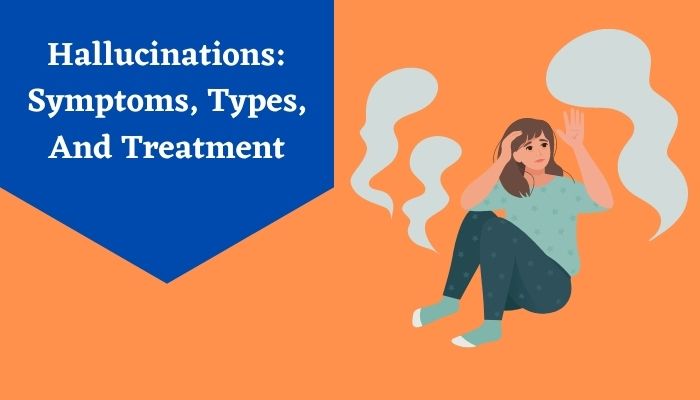Hallucinations are a form of mental experience wherein the person can sense objects, people, or even a feeling that seems real but is not rooted in reality.
To define hallucinations, we need to understand that the person experiencing them is losing touch with reality. The images they see, the sounds they hear, or the things they feel with any of their 5 senses are not real. This may be a by-product of using a certain medication or drug, an imbalance in the nerve cells, or any other hallucination causes that we will discuss in this article.
Types Of Hallucinations
Hallucinations, or sensing otherwise unreal experiences, can come in many forms. It can affect different sensory organs or impact them all at once. Here are the types of hallucinations people often experience:Auditory Hallucinations
Auditory hallucinations are the sensations of hearing someone or something that influences behaviour. People suffering from these types of hallucinations can often hear a voice that tells them to do things that they may or may not be aware of. The voice may seem agitated, loving, or completely neutral.People suffering from auditory hallucinations symptoms may also hear sounds from quiet places or rhythmic noise patterns.
Visual Hallucinations
Visuals are the most common types of hallucinations. People who suffer from it often see things that don’t exist or aren’t present. They can see people, objects, or even patterns of lights, sounds, shapes, etc.Olfactory Hallucinations
These types of hallucinations inspire smelling things that may or may not exist. People suffering from these hallucinations symptoms often feel like they can smell something awful or a beautiful fragrance that no one else can. They may even start smelling odour on themselves when it doesn’t exist.Gustatory Hallucinations
People with gustatory hallucinations experience similar effects with taste. They can taste elements in things they consume that they diversify. Most of the time it is harmless but sometimes the person with hallucinations symptoms may experience negative effects and panic imagining that someone is trying to poison them.Tactile Hallucinations
The tactile sensation is the final and strangest type of hallucination. People experiencing these hallucinations symptoms often feel like there are frightening things on their body or experience ethereal touches on the skin.Hallucinations Symptoms
The symptoms are largely related to the hallucinations causes and the types of hallucinations the person experiences. Here are a few hallucinations symptoms that most people display:- Seeing things that are not real, maybe objects or people
- Seeing patterns in lights and sound energies or simply in the form of blinking lights
- Hearing voices that are almost unworldly and try to influence your behaviour
- Hearing rhythmic patterns such as footsteps, scratching, music, loud doors, etc.
- Sensing odours and fragrances that no one else can smell
- Sensing tastes of elements, especially metallic flavours
- Sensing things crawling on the body
- Feeling ethereal touches on the skin
Hallucinations Causes
There are several hallucinations causes, so let us take a look at what they are:Medication
Medications that are composed of strong doses, especially those used to treat mental and physical illnesses often cause hallucinations symptoms.Mental Illnesses
Certain mental illnesses that revolve around dementia cause hallucinations as a byproduct. People suffering from Schizophrenia, delirium, etc. are highly likely to hallucinate more frequently.Lack Of Adequate Sleep
Interrupted sleeping patterns, staying awake for days, or just lacking proper sleep every night can cause hallucinations symptoms too. You may even hallucinate right before you fall asleep or just before you wake up in the form of hypnagogic or hypnopompic hallucinations respectively.Substance Abuse
Substance abuse is the most common cause of hallucinations that you can control. People abusing alcohol or other substances often tend to hear or see things. People abusing drugs like PCP or LSD or also likely to hallucinate in tactile visual, and auditory hallucinations more often.Hallucinations causes can also stem from other health conditions, thus resulting in hallucinations symptoms due to unrelated issues such as:
- High to very high fever
- Problems with sensory organs, especially due to issues with vision, blindness, ad deafness.
- Seizures
- Epilepsy (can also cause the patient to see spots and flashing lights).
- Migraine
- Terminal cases of diseases such as HIV stage 3, liver or kidney failure, or brain cancer.
- Limited social interaction due to isolation, especially in children and the elderly.
Hallucination Treatment
If you spot the hallucinations symptoms in yourself or someone you know, then seek medical advice at the earliest. The treatment will depend entirely on the hallucinations causes that affect the condition. Medical professionals will diagnose the root of the hallucinations symptoms ad either isolate and remove it or introduce measures to alter the hallucinations causes.Here are some of the treatment types for hallucinations symptoms:
Using Medication
As we have mentioned, the treatment depends on the hallucinations causes that affected the condition. Thus, doctors will conduct a thorough analysis to identify if the hallucinations symptoms are a result of prescribed medications or because you need one.If it is due to a continuing dosage, doctors will often alter the medication which may be affecting the nervous system with a higher dosage of certain components.
If, on the other hand, the hallucinations symptoms are a cause of physical ailments that include alcohol withdrawal, doctors will prescribe medications to calm your nerves. If it is due to substance abuse or related issues, they will prescribe targeted medication that does not induce hallucinations. If it is due to chronic illnesses that cause dementia, alternative medication will be prescribed to control the effects.
Seeking Counselling
Another effective method of treating hallucinations symptoms is counselling with a certified professional. Often talking about the cause of hallucination coupled with appropriate medications can help stop the delirium temporarily or even remove the cause permanently.Hallucinations can be mild for some people but outrageously impactful for others. If you experience hallucinations symptoms frequently or know someone who does, seek medical attention to address the issue as early as possible.


